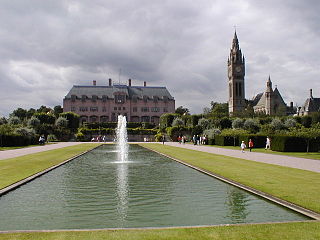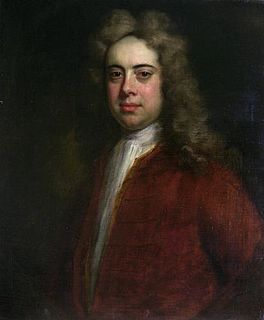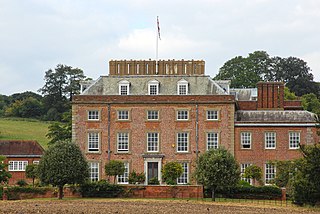Related Research Articles

Sir James Montgomery, 1st Baronet Stanhope FRSE was a Scottish advocate, judge, country landowner, agriculturalist and politician who sat in the House of Commons from 1766 to 1775. In 1783 he was a joint founder of the Royal Society of Edinburgh.

James Murray, 2nd Duke of Atholl, styled Marquess of Tullibardine between 1715 and 1746, was a Scottish peer, and Lord Privy Seal.

Charles Colyear, 2nd Earl of Portmore, KT, known as Lord Milsington to 1730, of Portmore House, Weybridge, Surrey, was a British Whig politician who sat in the House of Commons between 1726 and 1730, when he succeeded to the peerage as Earl of Portmore. He subsequently became a Scottish representative peer in the House of Lords. He was a racehorse owner and was known as Beau Colyear for his conspicuous dress.

Sir Robert Grosvenor, 6th Baronet of Eaton Hall, Cheshire, was an English politician who sat in the House of Commons from 1733 to 1755. He was an ancestor of the present Dukes of Westminster.
John Murray, of Philiphaugh, Selkirk, was a Scottish politician who sat in the House of Commons from 1725 to 1753.

William James Conolly was an Anglo-Irish landowner and Whig politician who sat in the Irish House of Commons from 1727 to 1754 and in the British House of Commons from 1734 to 1754.

Charles Cobbe was Archbishop of Dublin from 1743 to 1765, and as such was Primate of Ireland.

Pattee Byng, 2nd Viscount Torrington,, was a British Army officer and politician who sat in the House of Commons from 1723 to 1733 when he succeeded to the peerage as Viscount Torrington. His career included service as Captain of the Yeomen of the Guard during the reign of King George II.

Sir John Evelyn, 2nd Baronet was a British courtier and Whig politician who sat in the House of Commons for 40 years from 1727 to 1767.
William Sutherland, 17th Earl of Sutherland, previously named William Gordon, 17th Earl of Sutherland,, was a Scottish politician who sat in the House of Commons from 1727 until 1733 when he succeeded to the peerage as Earl of Sutherland. He was chief of the Clan Sutherland, a Scottish clan of the Scottish Highlands.
Colonel John Selwyn of Matson, Gloucestershire, was a British Army officer, courtier and politician who sat in the House of Commons between 1715 and 1751.

Alexander Brodie, 19th of that Ilk was a Scottish clan chief and politician from Moray. He sat in the House of Commons of Great Britain for 34 years from 1720 to 1754, as a government supporter. For 27 years he was Lord Lyon King of Arms, the most junior of the Scottish Great Officers of State, responsible for regulating the heraldry of Scotland.
Richard Plumer was a British politician who sat in the House of Commons from 1722 to 1750.
Lieutenant-General James Scott, of Commieston, Kincardine, was a British Army officer and politician who sat in the House of Commons from 1713 to 1734. He served in the Scots Guards for 51 years
Thomas Norton (1684–1748) of Ixworth Abbey, Bury St. Edmunds, Suffolk, was a British landowner and Whig politician who sat in the House of Commons from 1727 to 1747.
Toby Chauncy, of Edgcote, Northamptonshire, was a British lawyer and politician who sat in the House of Commons from 1730 to 1733.

William Glanville (c.1686–1766), of St Clere, Kent was a British politician who sat in the House of Commons for 38 years from 1728 to 1766.
Legh Master (c.1694–1750) of New Hall, Ashton in Makerfield, Lancashire. and Codnor Castle, Derbyshire, was a British Tory politician who sat in the House of Commons from 1727 to 1747.
Richard Eliot (1694–1748), of St. Giles-in-the-Fields, Middlesex, was a British diplomat, official and politician who sat in the House of Commons from 1733 to 1748.
Thomas Bramston (c.1690–1765), of Skreens, near Maldon, Essex, was a British lawyer and Tory politician who sat in the House of Commons from 1727 to 1747.
References
- ↑ "RUTHERFORD, James (d.1747), of Bowland, Midlothian". History of Parliament Online. Retrieved 2 January 2019.